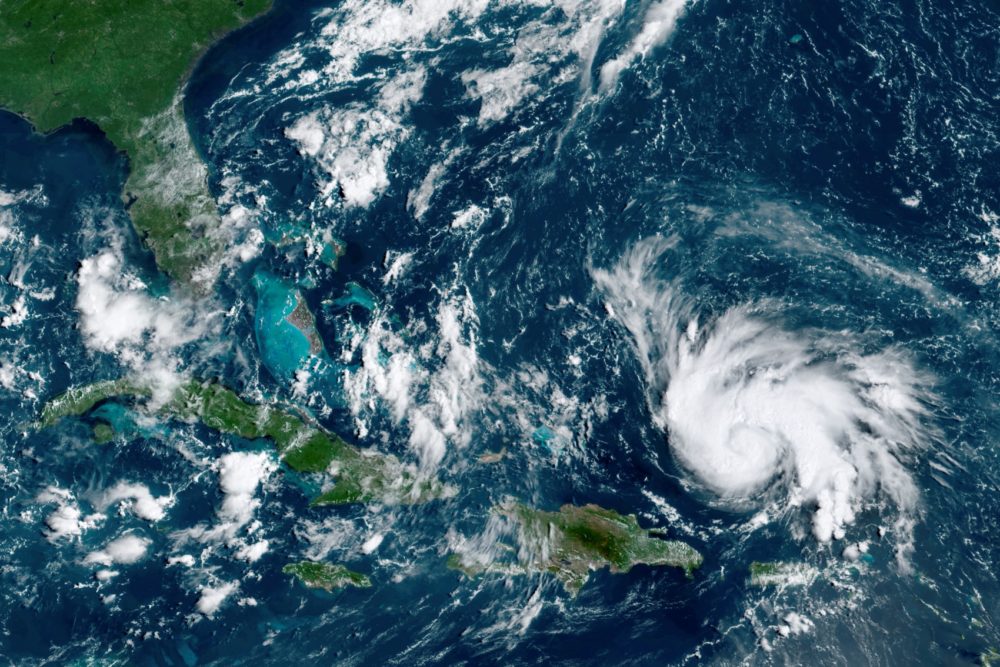Advertisement
News Roundtable
Week In The News: Hurricane Dorian, A Narrowing 2020 Field, Potential Trade Talks With China
Resume
With John Harwood
All eyes on Hurricane Dorian. The 2020 field narrows. China signals trade talks could be back on. Oklahoma’s $572 million judgment against Johnson & Johnson. Epstein’s accusers have their day in court. The roundtable weighs in.
Guests
Karen Travers, ABC News White House correspondent. (@karentravers)
Laura Barrón-López, national political reporter for POLITICO. (@lbarronlopez)
Jack Beatty, On Point news analyst. (@JackBeattyNPR)
From The Reading List
Weather Channel: "Hurricane Dorian Expected to Intensify to a Category 4 and Poses a Growing Danger to Southeast U.S., Especially Florida" — "At a Glance
- Hurricane Dorian is now centered in the western Atlantic Ocean.
- Dorian will then threaten parts of the Bahamas and the southeastern U.S. over Labor Day weekend.
- The most likely scenario is a track near the Florida Peninsula late in the weekend, but exact details will change.
- Residents from the northern Gulf Coast to Florida, Georgia and the Carolinas should monitor forecasts closely.
"Hurricane Dorian is forecast to intensify into a Category 4 hurricane and pose a major danger to the southeastern U.S., especially Florida, over Labor Day weekend.
"Dorian's center is about 220 miles north-northwest of San Juan, Puerto Rico, with maximum sustained winds of 85 mph.
"No hurricane watches or warnings in effect at this time, but they will likely be issued for parts of the Bahamas and Florida in the next day or two."
New Yorker: "A Smaller Debate Lineup Ushers In The Next Stage Of The 2020 Democratic Primary" — "As of Wednesday, the deadline set by the Democratic National Committee to qualify for the third primary debate, to be held in mid-September, only ten candidates had made the cut: Joe Biden, Kamala Harris, Bernie Sanders, Elizabeth Warren, Pete Buttigieg, Cory Booker, Beto O’Rourke, Amy Klobuchar, Julián Castro, and Andrew Yang. To make it, the candidates had to have received campaign contributions from a hundred and thirty thousand people and to have gained at least two-per-cent support in four national polls or polls of states with early primaries or caucuses. It wasn’t the highest of hurdles, when you consider the job that these people are going for, but it kept more than half the field out. Even before the third debate lineup was set, some of the race’s peripheral candidates—Jay Inslee, Seth Moulton, John Hickenlooper—had dropped out. Inslee, the governor of Washington, might in some ways consider his campaign, which centered on a forceful call for action on climate change, to have been a success. Moulton, a Massachusetts congressman trying to carve out a political identity as a hard-nosed veteran of America’s post-9/11 wars, will have a harder time saying what his run accomplished. His exit, as the Washington Post’s Alexandra Petri pointed out, called to mind G. K. Chesterton’s line about journalism consisting of saying 'Lord Jones Dead' to people who never knew that Lord Jones was alive.
"Is this the moment when a historically large Democratic field finally begins to contract? Since last winter, at political events around the country, I have encountered people lamenting how many choices they have. How was anyone supposed to learn about all of these people? Who has the time? And these were the people turning out at rallies and town halls months before any actual voting would take place. On Wednesday, having failed to qualify for the third debate, Kirsten Gillibrand, a senator from New York, announced that she, too, was dropping out. 'I think it’s important to know how you can best serve,' she said. That seems to be the takeaway that Hickenlooper, Colorado’s former governor, left the race with as well. He is now running for the Democratic Senate nomination in Colorado, where the incumbent Republican, Cory Gardner, is seen as vulnerable.
"Ten candidates means that ABC will be able to keep the debate to a single night. And it means that the candidates with the highest poll numbers, biggest campaigns, and most money in the bank will be onstage together during prime-time television for the first time. That’s a useful thing, up to a point."
Reuters: "Wall Street rises after China trade comments, tech boost" — "A rise in technology stocks lifted Wall Street on Thursday, as China sounded hopeful of a resolution to the protracted trade dispute with the United States, easing investor fears of the risk of a recession.
"China’s commerce ministry said both sides are discussing the next round of talks scheduled in September and hoped U.S. officials could cancel the planned additional tariffs to avoid an escalation, boosting sentiment and driving global stocks higher.
"U.S. President Donald Trump said in a Fox News radio interview that trade talks were scheduled for Thursday 'at a different level,' but did not provide additional details.
"Tariff-sensitive tech stocks .SPLRCT jumped 1.60%, boosted by gains in Apple Inc (AAPL.O) and Microsoft Corp (MSFT.O).
"Chipmakers which draw a large part of their revenue from China also gained, with the Philadelphia chip index .SOX up 2.5%. Among the few losers were defensive utilities .SPLRCU and consumer staples .SPLRCS sectors.
" 'Markets are trading on hopes because they (U.S., China) are going to be talking and for the time being things aren’t getting worse,' said Larry Adam, chief investment officer at Raymond James in Baltimore."
Anna Bauman produced this hour for broadcast.
This program aired on August 29, 2019.